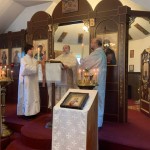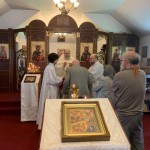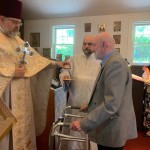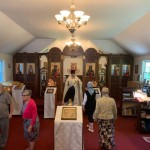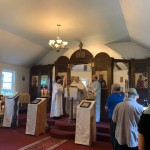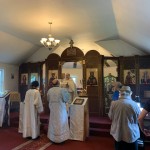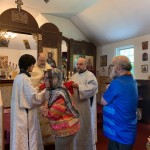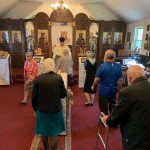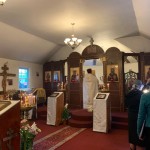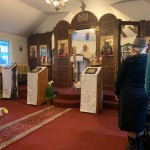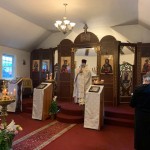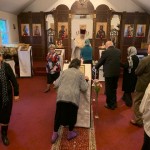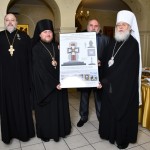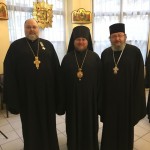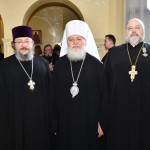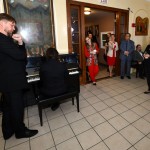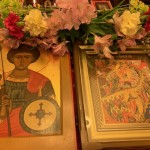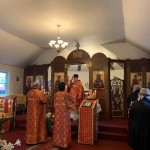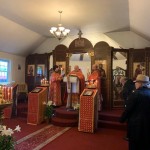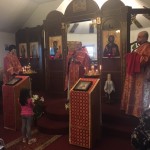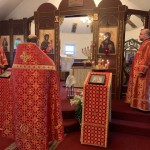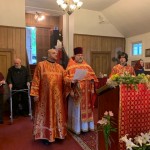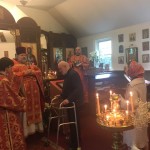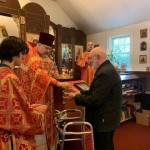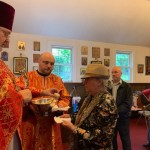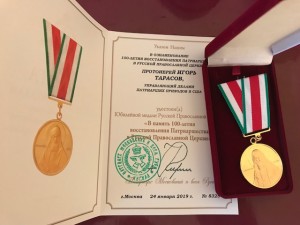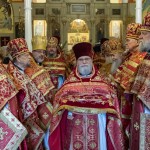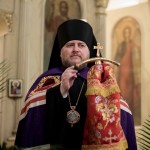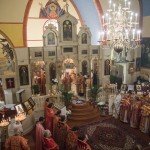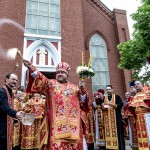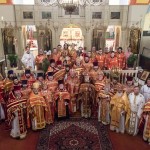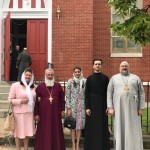On May 26, on the Sunday of the Samaritan Woman, we had a nice liturgical celebration in our temple. Rector of St. George Church, Archpriest Igor Tarasov served the Divine Liturgy. Following the Gospel lesson he preached the following homily in English:
“In today’s Gospel lesson we heard how our Lord Jesus Christ was having a conversation with a Samaritan woman and how He was explaining to that plain and uneducated person the meaning of the faith. Jesus compared faith to the living water, the water that makes someone alive and strong. Our Lord compared faith to the water because water is necessary for our life. Human body needs water and if it does not get it, it dies. In the same way human soul needs faith, and if it does not have it, it dies.”
“Our Lord Jesus Christ spoke with the Samaritan woman and explained to her how one should worship God. He said that true worship must be “in spirit and truth” (Jn. 4, 23). And we attempt to worship our true God in spirit and truth. Today we gathered here, at our parish temple, to have this service of the Divine Liturgy. The Samaritan woman asked Jesus where it is a right place to worship true God – in Jerusalem where the Jews had the Temple, or on Mt. Gerizim where the Samaritans had their sanctuary (Jn. 4, 20). The Lord answered her that “the hour is coming when you will neither on this mountain, nor in Jerusalem, worship the Father, and … when the true worshipers will worship the Father in spirit and truth” (Jn. 4, 23). The words of Christ came true, and now we, Christian people, worship everywhere on earth, but we worship in the holy places we call the churches, or the temples of God. Each Orthodox church can be compared to a well from which we draw the water, a living water to make our souls alive.”
“Some people may ask, “Why do you need a church if God is everywhere?” We may answer to that: “Yes, God is everywhere. But water is also everywhere in the world, it is in the air. But if you are thirsty, you don’t drink from the air, but you come to the well”. Such a well of the living water is the holy temple of God.”
“The Samaritan woman asked the Lord, “You have nothing to draw with, and the well is deep. Where then do You get that living water?” (Jn. 4, 11). So we may have difficulties to understand how we get the living water of God’s grace attending the temple. People with no faith or little faith don’t see how it is possible. But the Lord said, “He who believes in Me… out of his heart will flow rivers of living water” (Jn. 7, 38). We need to believe, then we will be able to come to the source of the living water which is given to us by our Lord for our salvation.”
“By coming to the temple, by supporting the church we fill that holy place with the living water. Overcoming different temptations and obstacles we support our Orthodox faith in this mostly non-Orthodox environment. Could you imagine a city or a town living without water? Could the inhabitants survive without it? However, many cities and towns live without Orthodox churches, even in the old country […]. And if people have no water in their town, they suffer and have to go far to get the water, they get sick and contaminated. In the same way people live spiritually without holy churches: they do not have the saving spiritual water.”
“Truly, as a man uses water to wash away the dirt from his body, he needs a church to wash away the spiritual dirt. He needs the church to repent, to cleanse his soul, so it can become pure. “Blessed are the pure in heart, for they will see God” (Mt. 5, 8). He needs it to be filled with the grace of God. It is also true that if a man is thirsty and has no water, he can attempt to get it from other sources, and then becomes poisoned. In the same way if people have no pure faith, the Orthodox faith, they seek to get it from the wrong hands – from the false religions, from the false teachers, from the sourcerers or astrologers who offer them poisonous drinks.”
“Dear brothers and sisters! We are very happy to have our parish temple, a source of the living water. We are sinful and imperfect like that Samaritan woman, but she believed that Jesus who spoke with her was Christ, the Savior of the world. Thus we also will believe in Him and keep that holy Orthodox faith, we will quench our spiritual thirst at the well of our holy temple, so we may cleanse, so we may become spiritually whole, so we may be filled with true life in Christ and inherit in Him life eternal. Let us glorify the Risen Lord Jesus Christ who abides with us until the end of time and who is giving us true living water!”
The choir prayerfully performed the Aposticha of Pascha and the Stichera of the Sunday of the Samaritan Woman before Holy Communion.
Following the dismissal of the Liturgy the Rector preached a short sermon in Russian stressing the main ideas of his English homily. He also congratulated Vitaly Malyshev on the occasion of his birthday and expressed heartfelt wishes to him. Traditional Polychronion (“Mnogaia leta!”) was proclaimed.

